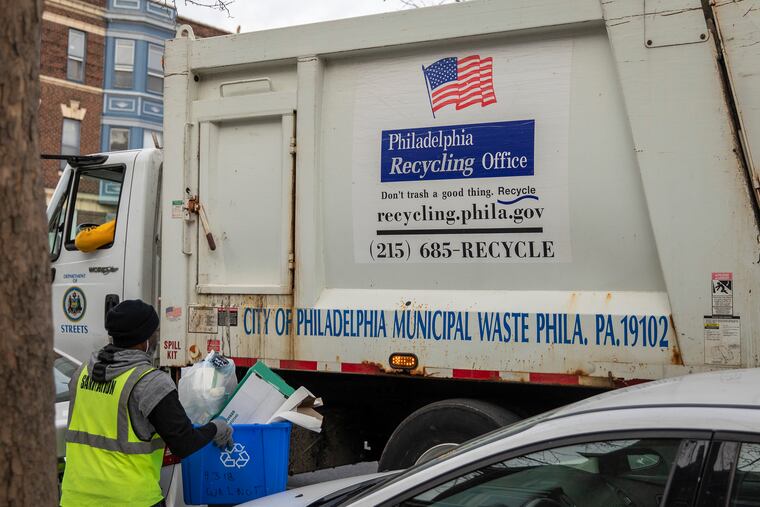How Philly can recycle better and save money doing it | Opinion
Throughout Pennsylvania and across the nation, basic practices are helping cities improve recycling rates and save taxpayer money.

Philly taxpayers will pay $9 million this year for curbside recycling, more than we’ve ever had to pay before, as The Inquirer’s Frank Kummer reported last week.
While overall this isn’t a lot of money for a basic municipal service and helping our environment (it’s 50 cents a month per Philadelphian), it doesn’t have to be even this much. Throughout Pennsylvania and across the nation, there are basic, decades-old recycling best-practices that cities are using that improve overall recycling rates — which is better for our environment — and save taxpayers money.
One of the best examples of a city utilizing smart practices is in State College, Pennsylvania where they’re paying one-fifth of what Philly is paying to process their recycling. Local officials there have prioritized quality by keeping recyclables in multiple streams when they’re put out on the curb, in turn reducing contamination and the amount of nonrecyclable items being picked up. This simple step increases the market value for companies who want to turn Centre County’s materials into new products, and they’ll pay the locally controlled Centre County Recycling and Refuse Authority top dollar for their recyclables.
Other policies that Philadelphia should implement include signing longer-term contracts that allow companies to capitalize on state-of-the-art facilities, bringing economic investment and jobs to the city.
Better yet, Philadelphia could follow other cities that are investing in public-owned facilities or through public-private partnerships. New York City signed onto a 20-year contract to improve their recycling efforts, and the success was obvious: $55 million in private investment to help build one of the most energy-efficient, technologically advanced recycling facilities in the nation.
Lastly, while the city should be applauded for taking steps to ban plastic bags — one of the worst offenders when it comes to contaminating our recycling stream — they need to do more. Philadelphia City Council should implement policies to ensure that all take-out containers are recyclable in the city’s program, and eliminate Styrofoam and nonrecyclable packages that are contaminating our recycling.
» READ MORE: How you can help Philly cut costs when it comes to recycling | Opinion
Philadelphia officials must commit to implementing these solutions as quickly as possible if they plan to keep their word and achieve the laudable but hefty goal of a “zero waste” city by 2035.
Sadly, what we often hear from city officials is that it’s up to state and federal officials to address our trash, litter, and recycling problems.
They are partially correct, but Philadelphians elect our decision-makers to implement local policies to solve the problems facing our communities, not throw their hands in the air and abdicate their responsibilities to politicians in Harrisburg or Washington.
It will take state action to improve recycling, disincentivize sending recyclable materials to landfills and incinerators that pollute our air and water, and halt the subsidies that make it appear that producing raw materials by cutting down trees for paper and fracking to make plastic is cheaper than reusing the materials we already have.
State legislators in Harrisburg should pass minimum recycled content standards to require companies to use recycled content for products they sell in Pennsylvania. These standards would improve the value and demand for recycled commodities regionally. A further step would be to push manufacturers to phase out nonrecyclable packaging through redesign or investments in local recycling infrastructure. The General Assembly should also pass requirements that stop companies from putting recycling labels on their products that aren’t actually recyclable here in Pennsylvania. All of these measures are simple, commonsense solutions that will go a long way toward improving Pennsylvania’s recycling efforts.
Additionally, legislators in Harrisburg should oppose House Bill 1100, which will give companies related to fracking hundreds of millions of dollars in tax breaks to continue our addiction to single-use plastics, petrochemical products, and fossil fuels. Instead of giving tax breaks to deep-pocketed polluting companies, they should invest that money into recycling programs across the state.
Of course, the best solution to our waste problem is addressing our current system of consumption: In Pennsylvania, like all of America, we have a “stuff” problem. Our economy encourages us to make, use, and toss at the greatest possible speed. Producers of the stuff we buy peddle this dangerous concept that we can use stuff and just throw it away. But there is no “away.”
David Masur is the executive director of PennEnvironment, a statewide, citizen-based nonprofit environmental group found at www.PennEnvironment.org. Alex Danovitch is a principal at Nothing Left to Waste, a national firm collaborating with nonprofits, municipalities, and institutions to change the model that perpetuates waste. www.nl2w.com